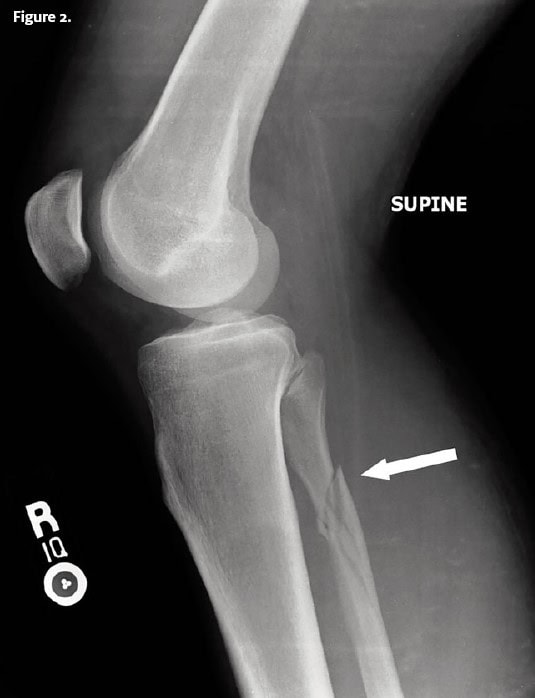Resolution

Differential Diagnoses
- Patella dislocation
- Tibial plateau fracture
- Comminuted fracture of the tibial shaft
- Osteolytic lesion of the proximal fibula
- Spiral fracture pathognomonic of physical abuse
Resolution
Diagnosis
Spiral fracture of the proximal fibula (Maisonneuve fracture; Figure 2).
Learnings
The proximal tibia and fibula are held together by a strong interosseous membrane. When there is a significant ankle injury, typically an internal rotation of the leg on a planted foot (causing external rotation of the foot), this membrane can be torn, with resultant spiral fracture of the proximal fibula, called a Maisonneuve fracture. It may be present even without an ankle fracture.
The mechanism is typically a sports related injury, but these fractures can also occur from slipping on the ice, running, walking, a motor vehicle accident, or a fall from a height. These fractures are often overlooked because patients typically report pain at the ankle but not at the proximal fibula. If this area is not palpated, a Maisonneuve fracture may be missed. When there is pain with palpation at the proximal fibula, obtain a fibula x-ray to look for a Maisonneuve fracture. This is an unstable fracture and typically requires surgical repair.
Treatment in an urgent care center involves immobilization, use of crutches and avoidance of weight-bearing, and referral to an emergency department (ED) or an orthopedist. Pain medication should be administered.
Consider compartment syndrome when there are signs and symptoms of significant swelling, severe pain (often out of proportion to the pain level expected for the injury), possibly bruising, and paresthesias. Consider other injuries to the joints above and below, as typically is done with orthopedic injuries.
Make copies of the x-rays to send to the ED or orthopedist. If there is suspicion of a significant ankle injury, a stress ankle x-ray can be performed, but if the disposition is to the ED or orthopedics and the patient cannot bear weight, this will be unlikely to change treatment.
Even when there is not a history of pain at the proximal fibula, palpate this location in all ankle injuries to assess for a Maisonneuve fracture.
